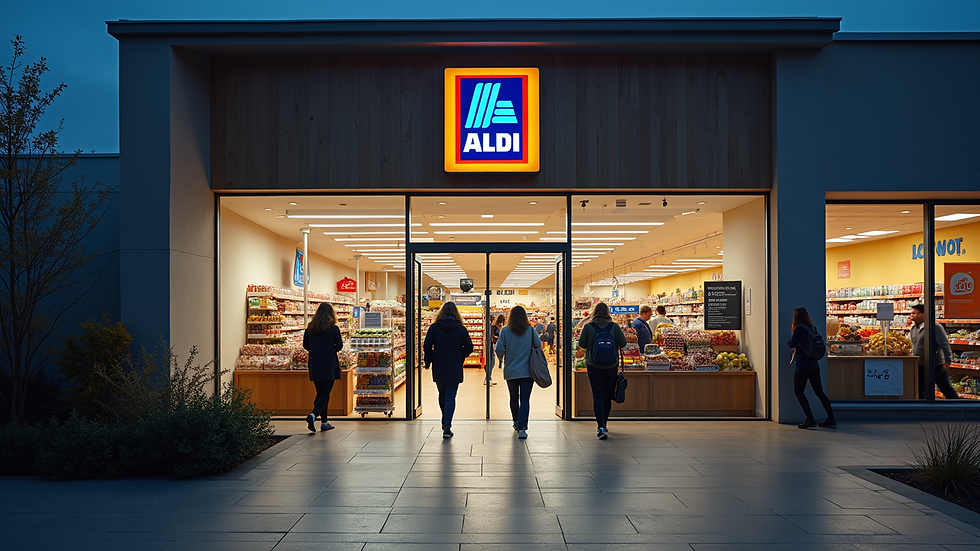Exploring the Impact of SHAP CANDY BAN on Soda Purchases in New York's Walmart and Aldi
- edu.plus.weatherray Rome
- Aug 6, 2025
- 4 min read
The SHAP CANDY BAN has sparked widespread discussion among New Yorkers, particularly regarding its effects on soda purchases. As this legislation unfolds, major retailers like Walmart and Aldi take center stage. These stores are go-to choices for many shoppers looking for convenience and good deals. In this post, we will look at how the SHAP CANDY BAN might change soda buying habits at these retailers and explore the broader aim of this regulation: promoting healthier choices among consumers.
SHAP CANDY BAN
The SHAP CANDY BAN is a public health initiative targeting sugary snacks and beverages that play a significant role in rising obesity rates. This legislation aims to reduce the availability of high-calorie, low-nutritional-value products in major stores. As part of this ban, sodas that exceed set sugar limits, specifically those containing more than 25 grams per 12-ounce serving, are under review. This could lead to notable shifts in how consumers shop for beverages.
The main goal of the SHAP CANDY BAN is to foster healthier eating habits among New Yorkers. With approximately 36% of adults in the state classified as obese, as per recent health statistics, the government is working to create an environment where healthier options are more accessible. By controlling the sale of high-sugar items, the state aims to reduce overall consumption of unhealthy products.
The Retail Landscape: Walmart vs. Aldi
Walmart and Aldi are among the largest grocery retailers in New York, serving different shopper needs. Walmart boasts a vast selection of products, offering everything from national brands to low-cost private-label options. Conversely, Aldi focuses on a streamlined shopping experience, keeping prices low while offering a limited selection of brands.
These contrasting strategies impact how the SHAP CANDY BAN will affect soda sales at each store. For example, Walmart's extensive inventory allows it to adjust more easily to the new regulations. It can modify stock levels and introduce healthier alternatives quickly. In contrast, Aldi may need to undertake significant changes in their inventory to align with the new requirements, an adjustment that could disrupt their typical low-cost model.
Consumer Reaction to the Ban
As the SHAP CANDY BAN becomes a reality, how consumers react at Walmart and Aldi will play a crucial role in measuring its success. Many shoppers are becoming more health-conscious, which has led to increased interest in low-sugar and healthier beverage options. However, soda remains a beloved drink for many, creating a challenge between consumer preferences and regulatory changes.
Initial feedback indicates shoppers are becoming aware of the ban and adjusting their habits accordingly. For instance, customers who usually grab sugary sodas may start choosing flavored sparkling water or diet sodas instead. According to a study from a leading beverage research group, demand for low-sugar drinks has increased by 14% over the past year, highlighting this potential shift. However, breaking long-standing purchasing habits will take time and effort.

The Availability of Healthier Options
One anticipated result of the SHAP CANDY BAN is a rise in healthier drink choices at Walmart and Aldi. Both retailers have shown a commitment to responding to consumer trends, and this legislation will likely accelerate that change.
Walmart has already started initiatives to broaden its selection of healthy beverages. For instance, the store is rolling out options like naturally flavored sparkling waters and a larger variety of sugar-free sodas. Aldi is likely to enhance its range of alternative drinks as well while maintaining its focus on affordability.
This shift toward healthier options may inspire innovation in beverage offerings. Retailers might experiment with new brands and products that comply with the new regulations while still attracting customers.
Potential Economic Impacts
While the SHAP CANDY BAN’s primary focus is on improving public health, its economic effects must also be considered. For Walmart and Aldi, soda sales might see a decline due to stricter regulations. However, this could be counterbalanced by a surge in sales of healthier alternatives.
As more consumers choose low-sugar drinks, retailers are likely to invest more in this category, improving product variety and availability. For instance, market research shows that sales of healthier beverages increased by 10% in the last year. Additionally, this evolving consumer preference may allow new brands to enter the market, creating fresh growth opportunities for retailers.
Future Trends in Beverage Purchases
Looking forward, the SHAP CANDY BAN could trigger broader changes in beverage consumption patterns. As health awareness rises, consumers may increasingly opt for low-sugar and health-focused drinks as their primary choices.
In response, Walmart and Aldi might adapt their marketing strategies to spotlight healthier products while deemphasizing traditional sugary sodas. This shift could shape a dynamic beverage landscape filled with innovative options that meet new health standards and cater to evolving consumer tastes.
Final Thoughts
In conclusion, the SHAP CANDY BAN is a significant action aimed at fostering healthier eating habits among New Yorkers, transforming the beverage market in stores like Walmart and Aldi. Adjusting to this change will take time, but as consumer habits evolve, the impact of the ban on soda purchases will become clearer.
As trends lean towards healthier drinks, both retailers must pay close attention to customer preferences. By offering a well-curated selection of beverages, they can help encourage healthier choices. With the collaboration of lawmakers, retailers, and consumers, the SHAP CANDY BAN can lead to a healthier future for New York State.

Overall, the changes in retail brought about by the SHAP CANDY BAN present a great chance to improve consumer diets, aligning with broader public health and wellness initiatives in society.



Comments